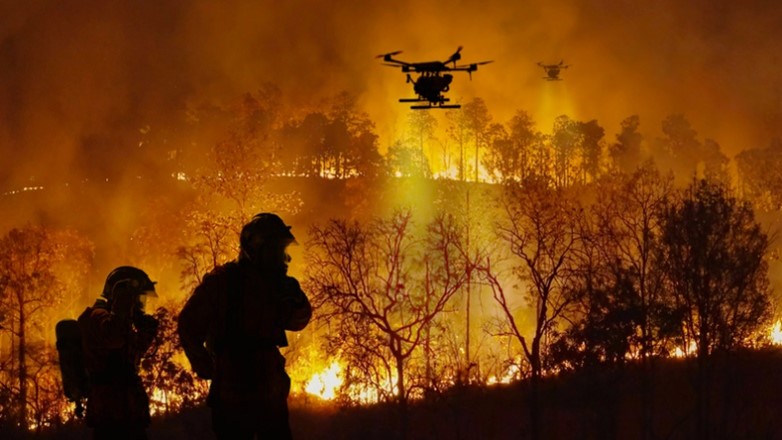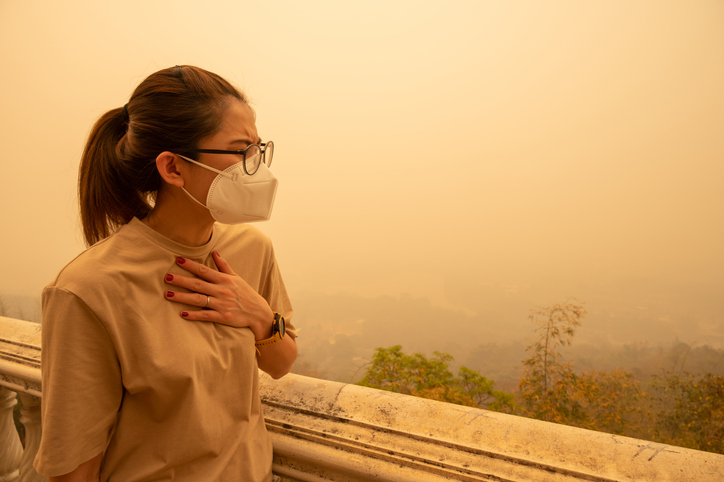The Mental Health Impacts of Wildfires
Wildfires, like other natural disasters and traumatic events, take a toll on the mental health of those directly affected and in the community. Whether the impact is the loss of a home, having to flee unexpectedly, dealing with the uncertainty of a fire’s path or worrying over smoke-filled skies, wildfires can lead to emotional distress.

The Substance Abuse and Mental health Services Agency notes that feelings such as “overwhelming anxiety, constant worrying, trouble sleeping, and other depression-like symptoms are common responses before, during, and after wildfires.” Other signs of emotional distress related to wildfires include:
- Having thoughts, memories, or nightmares related to the wildfire that you can’t seem to get out of your head
- Worrying a lot of the time
- Feeling guilty but not sure why
- Being frequently absent from work or school
Several recent studies provide insights on the extent of the impacts. A review of research in 2021 concluded that: “There is a strong body of literature to support the impact of wildfires on mental health, but more information is needed on the effective public health measures and rebuilding strategies that can optimize patient resilience post-wildfire.” (To 2021)

Other research has found an increase in emergency department visits for anxiety and use of mental health medications associated with local wildfires. To explore the connection between wildfire events and anxiety disorders, Qingyang Zhu, Ph.D., at Emory University, and colleagues used data on the locations of wildfires and wildfire smoke in five western states (Arizona, California, Nevada, Oregon, and Utah) between 2007 and 2018 and compared it to data on nearly 1.9 million emergency department visits for anxiety in these five states during the same period. They found within 48 hours of exposure to wildfire smoke, people were more likely to visit the emergency room for an anxiety condition and the impact was greater among women and girls and elderly individuals. (Zhu 2024)
In another study, Zachary Wettstein, M.D., with the University of Washington, and Ambarish Vaidyanathan, Ph.D., with CDC, looked at exposure to 25 large wildfires in California and the use of psychotropic medications. Using data from a commercial insurance database, they compared prescriptions in fire-affected counties in the six weeks before and after the wildfires over the period 2011 to 2018. They found a statistically significant increase in antidepressants, anxiolytics, and mood stabilizers (but not antipsychotics or hypnotics). The increase was greater among women than men. (Wettstein 2024)
Both studies only account for people who access mental health services and therefore may underestimate the impacts of wildfire exposure, the authors note. Another recent study looked at people who had been directly or indirectly exposed to a major wildfire and a control group without exposure. They found that the individuals exposed to the fire experienced cognitive impacts including a diminished ability to concentrate up to a year after the fire exposure. (Grennan 2023)
Experts told Psychiatric News that this type of research can be useful in helping public health agencies inform and protect the public and to help advocate for policy change. Read more in Psychiatric News. (Bredbenner 2024)
More information and Getting Help
- Disaster Distress Helpline - Call or text 1-800-985-5990
National hotline providing disaster crisis counseling. - SAMHSA: Warning Signs and Risk Factors for Emotional Distress from wildfires and other disasters
References
- Bredbenner, A. 2024 Understanding the Psychological Impacts of Wildfires. Psychiatric News. Volume 59, Number 05, April 2024. https://doi.org/10.1176/appi.pn.2024.05.5.6 April 2024
- Zhu, Q., Zhang, D., Wang, W. et al. Wildfires are associated with increased emergency department visits for anxiety disorders in the western United States. Nat. Mental Health 2, 379–387 (2024). https://doi.org/10.1038/s44220-024-00210-8
- Wettstein Z.S., Vaidyanathan A. 2024. Psychotropic Medication Prescriptions and Large California Wildfires. JAMA Network Open. 2024;7(2):e2356466. doi:10.1001/jamanetworkopen.2023.56466
- To, P., Eboreime, E., & Agyapong, V. I. O. (2021). The Impact of Wildfires on Mental Health: A Scoping Review. Behavioral sciences (Basel, Switzerland), 11(9), 126. https://doi.org/10.3390/bs11090126
- Grennan, G.K., et al. 2023. Differences in interference processing and frontal brain function with climate trauma from California’s deadliest wildfire. PLOS Climate. https://doi.org/10.1371/journal.pclm.0000125
- SAMHSA. n.d. Types of Disasters: Wildfires. https://www.samhsa.gov/find-help/disaster-distress-helpline/disaster-types/wildfires
